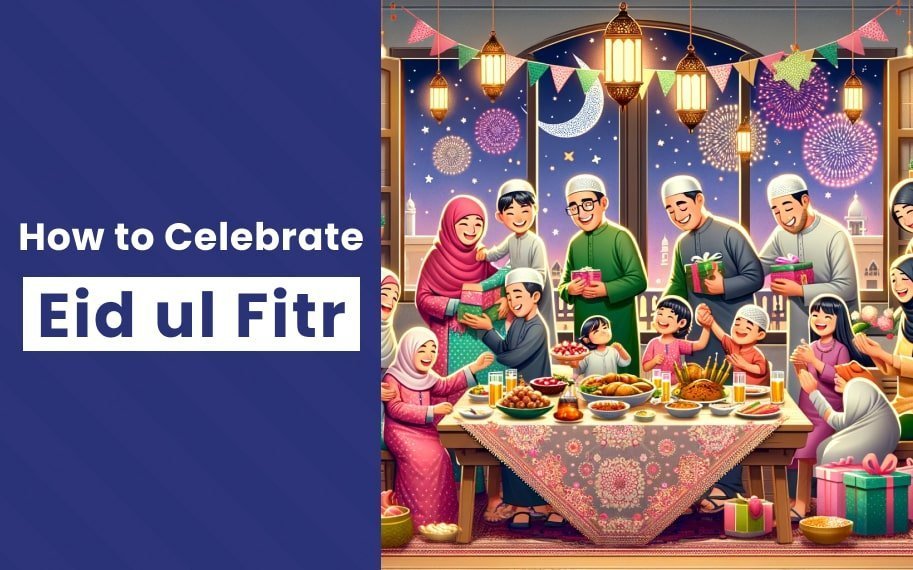
Eid ul-Fitr, also known as the “Festival of Breaking the Fast,” is a significant religious holiday celebrated by Muslims worldwide to mark the end of Ramadan, the Islamic holy month of fasting. This joyous occasion is one of the most important in the Islamic calendar and is a time for community, feasting, and giving thanks to Allah for the strength to complete the fast. Here’s a detailed guide on how to celebrate Eid ul Fitr 2024 in a meaningful and respectful way.
Table of Contents
Preparation for Eid ul-Fitr
Plan: As the exact date of Eid ul-Fitr is determined by the sighting of the moon, it can be difficult to plan. However, it’s important to be prepared for when the announcement is made. Ensure you have new clothes to wear, gifts ready for family and friends, and ingredients for special dishes.
Pay Zakat al-Fitr (Fitrana): Before the Eid prayers, Muslims are obligated to give a specific type of charity known as Zakat al-Fitr. This is intended to purify those who fast from indecent acts or speech and help the poor and needy.
Eid Prayers
Attend the Eid Salah: The Eid prayer is performed in the congregation and is an integral part of the celebration. It is usually held in large open areas or mosques. Arrive early to find a spot and participate in the communal takbirs that are recited before the prayer begins.
Dress Appropriately: Wear your best clothes on Eid day. It is customary to wear new clothes, but if that’s not possible, wear the cleanest and most presentable clothes you have.
Festive Meals
Prepare Special Dishes: Food is a major part of Eid ul-Fitr. Families prepare special dishes that are unique to their culture and traditions. Common foods include sweet dishes like maamoul, baklava, and sheer khurma.
Share with Neighbors and the Less Fortunate: Eid is about sharing joy and blessings. Prepare extra food to share with neighbors, regardless of their faith, and provide for those less fortunate.
Social Customs
Visit Family and Friends: Eid is a time to visit relatives and friends, exchange gifts, and offer congratulations. It’s a time for reconciliation, so if any strained relationships exist, this is a good time to mend them.
Give Eidi: It is customary to give money to children and young adults within the family. This tradition, known as giving ‘Eidi,’ is a way of sharing happiness.
Reflect and Give Thanks
Reflect on the Month of Ramadan: Take some time to reflect on the experiences and lessons learned during Ramadan. Think about the spiritual growth you’ve achieved and how you can maintain it throughout the year.
Give Thanks: Offer thanks to Allah for the strength and willpower He provided you to complete the fast and for allowing you to witness and celebrate another Eid.
Conclusion
Eid ul-Fitr is more than just a celebration; it’s a reflection of unity, gratitude, and the joy of life. By following these customs and traditions, you can celebrate Eid ul-Fitr in a way that honors its true spirit and brings joy to those around you.
Remember, while these are traditional ways to celebrate Eid ul-Fitr, the most important aspect is the spirit of community, charity, and gratitude that the holiday represents. Eid Mubarak!
FAQs
What is Eid ul-Fitr?
Eid ul-Fitr, also known as the “Festival of Breaking the Fast,” is a religious holiday celebrated by Muslims worldwide. It marks the end of Ramadan, the Islamic holy month of fasting.
How is Eid ul-Fitr celebrated?
Eid ul-Fitr is celebrated with special prayers called Eid Salah, feasting, giving gifts, and performing acts of charity. Muslims greet each other with “Eid Mubarak,” meaning “Blessed Eid,” and often wear new clothes for the occasion.
Why is Zakat al-Fitr important?
Zakat al-Fitr is a form of charity given to the poor at the end of Ramadan. It is obligatory for all Muslims who can afford it and is meant to purify those who fast from any indecent act or speech during Ramadan.
Why is Eid celebrated twice a year?
The two Eids—Eid ul-Fitr and Eid al-Adha—recognize, celebrate, and recall two distinct events significant to the story of Islam. Eid ul-Fitr celebrates the end of fasting in Ramadan, while Eid al-Adha commemorates the willingness of Ibrahim (Abraham) to sacrifice his son in obedience to Allah.
Read Also

